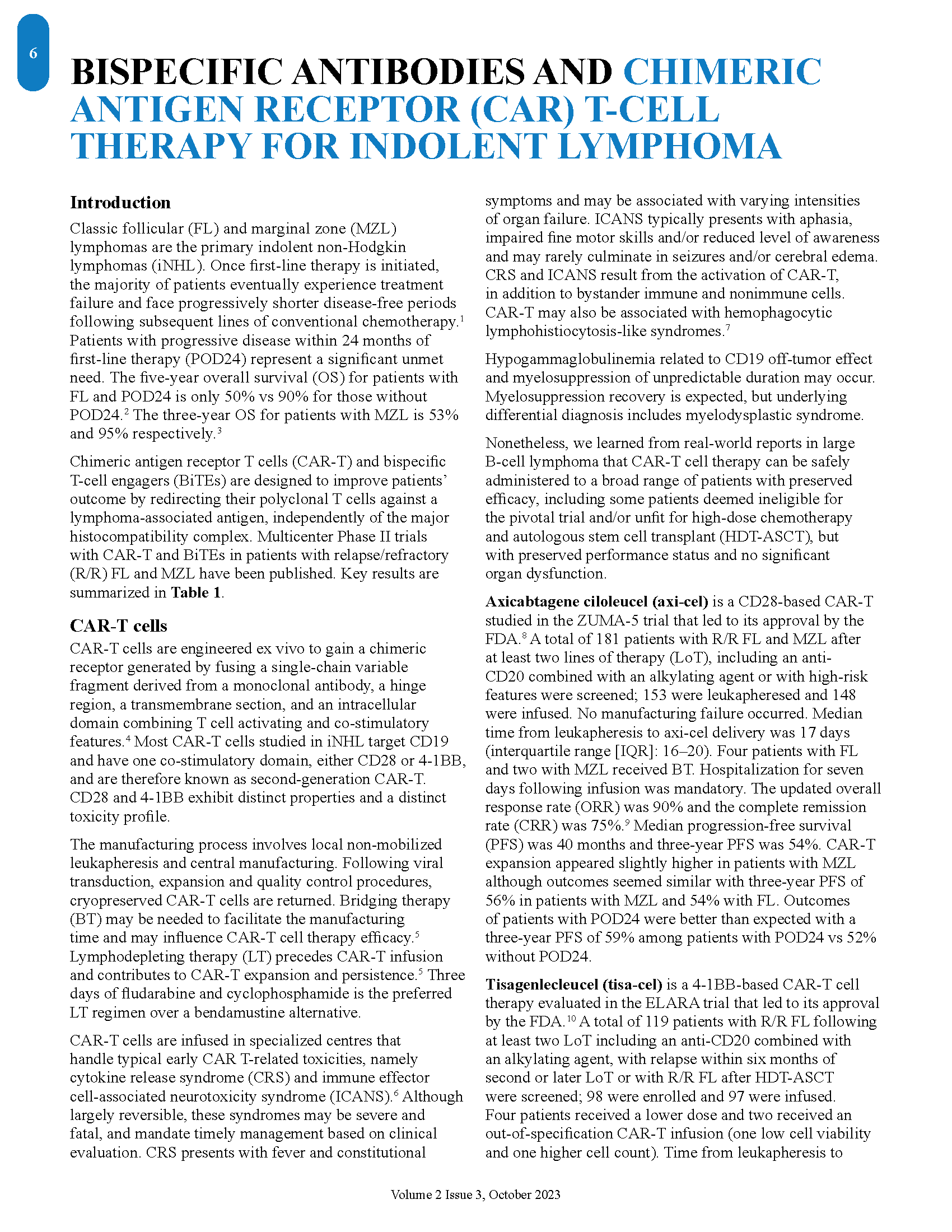Bispecific antibodies and chimeric antigen receptor (CAR) T-cell therapy for indolent lymphoma
DOI:
https://doi.org/10.58931/cht.2023.2338Abstract
Classic follicular (FL) and marginal zone (MZL) lymphomas are the primary indolent non-Hodgkin lymphomas (iNHL). Once first-line therapy is initiated, the majority of patients eventually experience treatment failure and face progressively shorter disease-free periods following subsequent lines of conventional chemotherapy. Patients with progressive disease within 24 months of first-line therapy (POD24) represent a significant unmet need. The five-year overall survival (OS) for patients with FL and POD24 is only 50% vs 90% for those without POD24. The three-year OS for patients with MZL is 53% and 95% respectively.
References
Link BK, Day BM, Zhou X, et al. Second-line and subsequent therapy and outcomes for follicular lymphoma in the United States: data from the observational National LymphoCare Study. Br J Haematol. 2019;184(4):660-663. doi:https://doi.org/10.1111/bjh.15149 DOI: https://doi.org/10.1111/bjh.15149
Casulo C, Byrtek M, Dawson KL, et al. Early Relapse of Follicular Lymphoma After Rituximab Plus Cyclophosphamide, Doxorubicin, Vincristine, and Prednisone Defines Patients at High Risk for Death: An Analysis From the National LymphoCare Study. J Clin Oncol. 2015;33(23):2516-2522. doi:https://doi.org/10.1200/JCO.2014.59.7534 DOI: https://doi.org/10.1200/JCO.2014.59.7534
Luminari S, Merli M, Rattotti S, et al. Early progression as a predictor of survival in marginal zone lymphomas: an analysis from the FIL-NF10 study. Blood. 2019;134(10):798-801. doi:https://doi.org/10.1182/blood.2019001088 DOI: https://doi.org/10.1182/blood.2019001088
Sterner RC, Sterner RM. CAR-T Cell therapy: Current Limitations and Potential Strategies. Blood Cancer Journal. 2021;11(4):1-11. doi:https://doi.org/10.1038/s41408-021-00459-7 DOI: https://doi.org/10.1038/s41408-021-00459-7
Amini L, Silbert SK, Maude SL, et al. Preparing for CAR T cell therapy: patient selection, bridging therapies and lymphodepletion. Nature Reviews Clinical Oncology. 2022;19(5):342-355. doi:https://doi.org/10.1038/s41571-022-00607-3. DOI: https://doi.org/10.1038/s41571-022-00607-3
Morris EC, Neelapu SS, Giavridis T, Sadelain M. Cytokine release syndrome and associated neurotoxicity in cancer immunotherapy. Nature Reviews Immunology. 2021;22(2). doi:https://doi.org/10.1038/s41577-021-00547-6 . DOI: https://doi.org/10.1038/s41577-021-00547-6
Hines MR, Knight TE, et al.. Immune effector cell-associated hemophagocytic lymphohistiocytosis-like syndrome. Transplant Cell Ther. 2023 Jul;29(7):438.e1-438.e16. DOI: https://doi.org/10.1016/j.jtct.2023.03.006
Jacobson CA, Chavez JC, Sehgal AR, et al. Axicabtagene ciloleucel in relapsed or refractory indolent non-Hodgkin lymphoma (ZUMA-5): a single-arm, multicentre, phase 2 trial. The Lancet Oncology. 2022;23(1):91-103. doi:https://doi.org/10.1016/S1470-2045(21)00591-X DOI: https://doi.org/10.1016/S1470-2045(21)00591-X
Chavez J, Sehgal AR, et al. 3-year follow-up analysis of ZUMA-5: a phase 2 study of axicabtagene ciloleucel (Axi-Cel) in patients with relapsed/refractory (R/R) indolent non-Hodgkin lymphoma (iNHL). Blood (2022) 140 (Supplement 1): 10380–10383. DOI: https://doi.org/10.1182/blood-2022-156120
Fowler NH, Dickinson M, et al. Tisagenlecleucel in adult relapsed or refractory follicular lymphoma: the phase 2 ELARA trial. Nat Med 2022 Feb;28(2):325-332.
Dreyling M, Dickinson M, Martinez Lopez J, et al. Long-Term Clinical Outcomes and Correlative Efficacy Analyses in Patients (Pts) with Relapsed/Refractory Follicular Lymphoma (r/r FL) Treated with Tisagenlecleucel in the Elara Trial. Blood. 2022;140(Supplement 1):1459-1463. doi:https://doi.org/10.1182/blood-2022-158024. DOI: https://doi.org/10.1182/blood-2022-158024
Morschhauser F, Dahiya S, et al. TRANSCEND FL: Phase 2 study results of lisocabtagene maraleucel (LISO-CEL) in patients (PTS) with relapsed/refractory (R/R) follicular lymphoma (FL). Hematol Oncol. 2023;41(S2):877-880. DOI: https://doi.org/10.1002/hon.3196_LBA4
Budde LE, Sehn LH, Matasar M, et al. Safety and efficacy of mosunetuzumab, a bispecific antibody, in patients with relapsed or refractory follicular lymphoma: a single-arm, multicentre, phase 2 study. The Lancet Oncology. 2022;23(8):1055-1065. doi:https://doi.org/10.1016/S1470-2045(22)00335-7 DOI: https://doi.org/10.1016/S1470-2045(22)00335-7
Bartlett NL, Sehn LH, Matasar MJ, et al. Mosunetuzumab monotherapy demonstrates durable efficacy with a manageable safety profile in patients with relapsed/refractory follicular lymphoma who received ≥2 prior therapies: updated results from a pivotal phase II study. Blood. 2022;140(Supplement 1):1467-1470. doi:https://doi.org/10.1182/blood-2022-157691. DOI: https://doi.org/10.1182/blood-2022-157691
Dean EA, Mhaskar RS, Lu H, et al. High metabolic tumor volume is associated with decreased efficacy of axicabtagene ciloleucel in large B-cell lymphoma. Blood Advances. 2020;4(14):3268-3276. doi:https://doi.org/10.1182/bloodadvances.2020001900. DOI: https://doi.org/10.1182/bloodadvances.2020001900
Bannerji R, Arnason JE, Advani RH, et al. Odronextamab, a human CD20×CD3 bispecific antibody in patients with CD20-positive B-cell malignancies (ELM-1): results from the relapsed or refractory non-Hodgkin lymphoma cohort in a single-arm, multicentre, phase 1 trial. The Lancet Haematology. 2022;9(5):e327-e339. doi:https://doi.org/10.1016/s2352-3026(22)00072-2. DOI: https://doi.org/10.1016/S2352-3026(22)00072-2
Novelli S, S. Luminari, M. Taszner, et al. Odronextamab in patients with relapsed/refractory follicular lymphoma (FL) Grade 1-3A: results from a prespecified analysis of the pivotal phase II study ELM-02. Hematol Oncol. 2023 June 9;41(S2):121-122. DOI: https://doi.org/10.1002/hon.3163_82
Hutchings M, Mous R, Clausen MR, et al. Dose escalation of subcutaneous epcoritamab in patients with relapsed or refractory B-cell non-Hodgkin lymphoma: an open-label, phase 1/2 study. The Lancet. 2021;398(10306):1157-1169. doi:https://doi.org/10.1016/S0140-6736(21)00889-8. DOI: https://doi.org/10.1016/S0140-6736(21)00889-8
Merryman R, Belada D, Sureda A, et al. 2023 ASCO Annual Meeting; Abstract. J Clin Oncol;41(16 suppl):750.
Hutchings M, Morschhauser F, Iacoboni G, et al. Glofitamab, a novel, bivalent CD20-targeting T-cell–engaging bispecific antibody, induces durable complete remissions in relapsed or refractory B-cell lymphoma: a phase I trial. J Clin Oncol. 2021;39(18):1959-1970. doi:https://doi.org/10.1200/jco.20.03175. DOI: https://doi.org/10.1200/JCO.20.03175
Ghione P, Palomba ML, Patel AR, et al. Comparative effectiveness of ZUMA-5 (axi-cel) vs SCHOLAR-5 external control in relapsed/refractory follicular lymphoma. Blood. 2022;140(8):851-860. doi:https://doi.org/10.1182/blood.2021014375. DOI: https://doi.org/10.1182/blood.2021014375
Salles G, Schuster SJ, Dreyling M, et al. Efficacy comparison of tisagenlecleucel vs usual care in patients with relapsed or refractory follicular lymphoma. Blood Advances. 2022;6(22):5835-5843. doi:https://doi.org/10.1182/bloodadvances.2022008150. DOI: https://doi.org/10.1182/bloodadvances.2022008150
Kymriah. [cited 2023 Oct 12]. Available from: https://pdf.hres.ca/dpd_pm/00047188.PDF
Yescarta. [cited 2023 Oct 12]. Available from: https://pdf.hres.ca/dpd_pm/00067754.PDF
Dickinson MJ, Carlo-Stella C, Morschhauser F, et al. Glofitamab for relapsed or refractory diffuse large B-cell lymphoma. N Engl J Med. 2022;387(24):2220-2231. doi:https://doi.org/10.1056/nejmoa2206913. DOI: https://doi.org/10.1056/NEJMoa2206913
Wang M, Munoz J, Goy A, et al. Three-Year Follow-Up of KTE-X19 in Patients With Relapsed/Refractory Mantle Cell Lymphoma, Including High-Risk Subgroups, in the ZUMA-2 Study. J Clin Oncol. 2022;41(3). doi:https://doi.org/10.1200/jco.21.02370. DOI: https://doi.org/10.1200/JCO.21.02370

Published
How to Cite
Issue
Section
License
Copyright (c) 2023 Canadian Hematology Today

This work is licensed under a Creative Commons Attribution-NonCommercial-NoDerivatives 4.0 International License.
